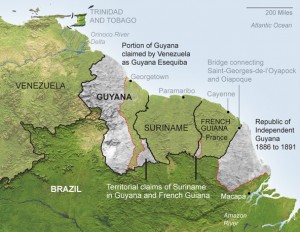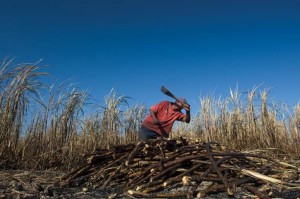UK supports Guyana in Venezuela border controversy
By Tracey Khan – Drakes
[www.inewsguyana.com] – The age old border controversy between Guyana and Venezuela needs to be approached differently if a solution is to be met, according to newly appointed United Kingdom High Commissioner to Guyana, Gregory James Quinn.
He noted that the Good Offices approach, which was established by the United Nations as a mechanism to assist in resolving Venezuela’s continued claim on a portion of Guyana’s Essequibo coast, has not been as effective as it was intended to be.
“I think it is probably time for a new approach…because the Good Office approach hasn’t actually produced a result and this now has a real impact because the maritime border hasn’t delineated it does have potential impact on Guyana,” the UK envoy told reporters recently.
The High Commissioner pledged the UK’s support of Guyana in this matter and when questioned whether the UK can offer more than just its declaration of support, he responded: “there are other options within the UN system which we can consider as a way of finishing this once and for all and we wouldn’t be seeking to impose ourselves to say what we think is the best way of doing that, but certainly if asked.”
Only recently government through the Ministry of Foreign Affairs announced its intention to opt out of the UN Good Offices process. In explaining the country’s decision and its desire to request a judicial settlement, Minister Carolyn Rodrigues-Birkett pointed out that the
process yielded little results over the last 25 years.
She said Guyana was examining other options while at the same time suggesting that Venezuela remained comfortable with the current process. These other options will eventually have to be decided by the UN Secretary General.
According to Article 33 of the UN Charter, in addition to “Good Offices,” the other options include the resort to mediation, facilitation, dialogue processes, arbitration and judicial settlement. However, all, except judicial settlement, have already been tried.
This most recent development in the territorial controversy arose just after the Venezuelan Foreign Minister objected to the exploratory drilling for oil by the American company, Exxon Mobil, in the concession granted by Guyana.
Venezuela claimed that the area is its territory despite the fact that the drilling area is deep within Guyana’s maritime economic zone. In response, Guyana’s foreign affairs ministry stated that it requested the Venezuelan government to desist from taking any actions that could only result in hindering the development of Guyana.

![British High Commissioner, James Gregory Quinn. [iNews' Photo]](http://www.inewsguyana.com/wp-content/uploads/2015/04/Gregory-Quinn-300x231.jpg)

